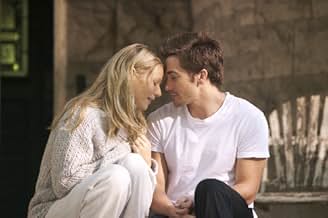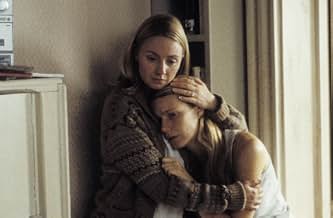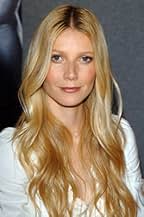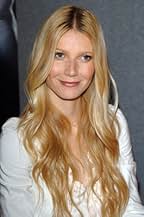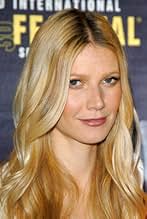La figlia di un matematico brillante ma mentalmente disturbato, recentemente scomparso, cerca di fare i conti con la sua possibile eredità: la sua follia.La figlia di un matematico brillante ma mentalmente disturbato, recentemente scomparso, cerca di fare i conti con la sua possibile eredità: la sua follia.La figlia di un matematico brillante ma mentalmente disturbato, recentemente scomparso, cerca di fare i conti con la sua possibile eredità: la sua follia.
- Premi
- 4 vittorie e 6 candidature totali
- Limo Driver
- (as Tobiacz Daszkiewicz)
- University Friend
- (as C Gerod Harris)
- American Student
- (non citato nei titoli originali)
- Wake Guest
- (non citato nei titoli originali)
Recensioni in evidenza
Mr. Auburn and Rebecca Miller, a movie director, herself, took the task of adapting "Proof" for the screen. The result, directed by John Madden, opens the play in cinematic terms, no small undertaking in presenting the movie to a wider audience who might not be interested in science, and much less in the advanced math that plays an important role in the proceedings.
If you haven't seen the film, please stop reading here.
Catherine, the 27 year old, at the center of the film, is a woman who has stayed behind to take care of her aging father, a man much esteemed in academic circles, who is suffering from, perhaps, a neurological illness that is killing him slowly. Catherine has, in a way, sacrificed her life in order to see that Robert spends his last days at home instead of at an institution.
The death of the father brings Claire home. This woman, who lives in New York, wants to get rid of everything connected with her father. She even has made plans for Catherine to move from Chicago to be near each other in New York, where things are much better. To complicate things, Harold, the nerdy math student, finds a hidden notebook that might contain a discovery that will revolutionize math. The only problem is the proof might not have been the dead man's own creation.
"Proof" works as a film because of Mr. Madden's direction. We are kept involved in what is going on because we have been won by Catherine, the wounded woman trying to live her life without having to tend to a sick man. Catherine love for math, in a way, makes her realize her place is in the same institution where her father made mathematical discoveries as she will be following his steps.
Gwyneth Paltrow makes an excellent Catherine, a role she had played on the London stage. Ms. Paltrow is a welcome presence in the movie because of the intelligence she projects when working with a good director like John Madden. In fact, it has been a while since we saw this actress in a film.
Hope Davis, another excellent actress, plays Claire, the materialistic sister who has arrived and who wants to transform the frumpy Catherine and mold her to her own taste. Ms. Davis has accustomed us to expect a valuable contribution to any film in which she plays. As Claire, she clearly understand who this character she is portraying really is.
Anthony Hopkins has only a few good moments on the screen. Jake Gyllenhaal's character Harold is not as effective as Ben Shenkman's was on the stage. In fact, Mr. Gyllenhaal, with his dark good looks, seems to be someone who would not be interested in math at all.
"Proof" is an immensely rewarding film thanks to what John Madden's vision.
I only have two quibbles. One, there was not enough mathematics in the movie OR the play. Everyone has studied advanced math, so why not challenge the audience a little more and let us in on what the proof is actually about. It is kind of like watching a movie about a musician and not letting the audience hear any of the music! Two, it is not believable that in a crucial scene towards the end of the movie, that neither Catherine and especially the more materialistic Claire would not care what ultimately happens to the proof, especially when being told of its possible value.
Aside from these flaws, if you are looking for intelligent fare and a break from mindless action films and the mostly unfunny comedies of the past summer, you owe it to yourself to see this film. The theater I saw it in was almost empty, so I fear it is not doing too well. Remember that every ticket you buy is a vote for more of that kind of film being made. Let's hear it for more stimulating and mature films like this one!
I didn't see the David Auburn play on which the movie is based, and maybe many of the film's detractors have: screen adaptations of favorite plays often seem to dilute them to the detriment of the story. But if this movie is worse than its stage counterpart, it must have made one damn fine play.
The acting in this film is its major attribute, and director John Madden is wise enough to realize the talent of his ensemble and stand out of their way. He plays a bit with chronology and lets the pieces of his story click into place much like a math puzzle; I don't know whether or not this is original to the film or borrowed from the play, but either way it works well. But mostly, he lets the actors strut their stuff, and the four principals make the most of meaty roles.
Most of the acclaim has been falling, and rightly so, to Gwyneth Paltrow, who gives a full-bodied, textured and powerful performance as Catherine, who has inherited her genius at math from her father and is deathly afraid that she may have inherited his madness as well. I don't know that Paltrow has yet had a role as substantial as this one, and she flexes her acting chops in a way I have not seen her do outside of her underrated performance in "Sylvia." Hope Davis matches her scene for scene as the astringent older sister; it's refreshing to see Davis break away from the mousy, mealy persona she so frequently adopts and play this crisp, overwhelming character. The male actors have less to do overall, but the roles are perfectly cast. Jake Gyllenhaal is ripe for stardom, and this may be the year that brings it. Anthony Hopkins has been dismissed as hammy here, but I think he does an effective job of portraying mental illness, and creates heartbreaking moments that could have been ruined had they been played differently.
"Proof" feels entirely honest about the dynamics of dysfunctional families; you just know David Auburn is writing from personal experience. Like Robert Redford's "Ordinary People," if you have any exposure to similar family dynamics, you know the team that put the film together got everything just right. "Proof" also creates a parallel between mathematics and the messiness of life that makes one re-evaluate the rigidity of what always appears to be an exact science. As one must accept a level of ambiguity in life, one must also be willing to make leaps of faith in mathematics, because nothing can be 100% proved.
I highly recommend this film. It's satisfying on both an intellectual and emotional level. And any movie that can make math exciting to me gets an automatic thumbs up.
Grade: A
This is story about mathematics, actually about mathematicians which is much, much better. "Beautiful Mind" was repellent in a few ways; one was in the cartoonish way mathematical imagination was shown. Another was the way history was bent away from a truly interesting story to be palatable for film audiences. Math at that level requires the juice of life that he took in large gulps from both sexes. And he was such a glutton for mindbending adventure that he bent his own mind. I do not believe he suffered from some genetic disease, nor did he.
This movie repairs some of that. Its clear I think that the Nash phenomenon is at work here: minds powerful enough to break themselves, possibly leaving some mathematical residue, possibly not. The focus on primes may be accidental, but it is apt. As time goes on, they become increasing rarer and infinitely more fascinating, all apparently random but with some hint of unseen order. They don't interest me so much...
In fact, selecting films to build into your life (perspectives and stories to live) is a lot like choosing the types of problems to work on and how. The proof of being in a way is that the selection is made deliberately, based on your weaknesses, not your strengths. Only weak mathematicians and souls work on problems they understand. No life comes from the undaunting. No magic ever comes alone or from peace.
Hopkins isn't obnoxious here. Its clear that he is acting and that the lines are those of a stage character. But he doesn't grandstand; he's gently broken and there are some sweet moments (only two, but central) where he seems to completely have second-guessed where his daughter is going and lucidly makes key suggestions. Hopkins understood those moments and gives then some significance.
Ted's Evaluation -- 3 of 3: Worth watching.
Lo sapevi?
- QuizAccording to the clues of Hal, played by Jake Gyllenhaal, the proof can be the proof of Riemann hypothesis. He says "a very important proof, of a mathematical theorem about prime numbers, which mathematicians are trying to prove; it's historic; you can publish it, give press conferences; all newspapers in the world will talk to the person who have found it." It's one of the Millennium Problems.
- BlooperThe daughter talks about how the father was looking for a message from aliens in the Dewey decimal call numbers on the books from the University of Chicago library. The University of Chicago uses Library of Congress call numbers, which begin with letters, not numbers.
- Citazioni
Catherine: [Reading Robert's Notebook] "Let X equal the quantity of all quantities of X. Let X equal the cold. It is cold in December. The months of cold equal November through February. There are four months of cold, and four of heat, leaving four months of indeterminate temperature. In February it snows. In March the Lake is a lake of ice. In September the students come back and the bookstores are full. Let X equal the month of full bookstores. The number of books approaches infinity as the number of months of cold approaches four. I will never be as cold now as I will in the future. The future of cold is infinite. The future of heat is the future of cold. The bookstores are infinite and so are never full except in September..."
- ConnessioniFeatured in The 63rd Annual Golden Globe Awards 2006 (2006)
- Colonne sonoreEl chocha loca
(2002)
Written by Claudio Quattrocchi
Performed by Loca
Published by Big Tiger Music (BMI)
Courtesy of Lovecat Records
By Arrangement with Ocean Park Music Group
I più visti
- How long is Proof?Powered by Alexa
Dettagli
- Data di uscita
- Paese di origine
- Sito ufficiale
- Lingua
- Celebre anche come
- Proof
- Luoghi delle riprese
- Aziende produttrici
- Vedi altri crediti dell’azienda su IMDbPro
Botteghino
- Budget
- 20.000.000 USD (previsto)
- Lordo Stati Uniti e Canada
- 7.535.331 USD
- Fine settimana di apertura Stati Uniti e Canada
- 193.840 USD
- 18 set 2005
- Lordo in tutto il mondo
- 14.189.860 USD
- Tempo di esecuzione1 ora 40 minuti
- Colore
- Mix di suoni
- Proporzioni
- 2.35 : 1
Contribuisci a questa pagina




